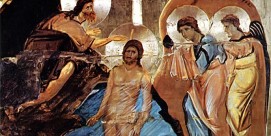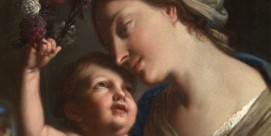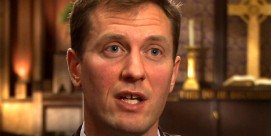Holy Week Celebrations
BOB ABERNETHY: Our story of Holy Week begins with Palm Sunday and is told by three narrators: Monsignor John Meier of Catholic University in Washington; Barbara Brown Taylor, an Episcopal priest in Georgia; and Reverend Charles Adams of Hartford Memorial Baptist Church in Detroit.
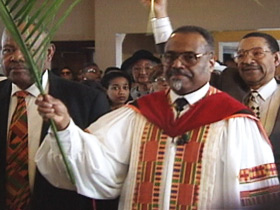
Reverend CHARLES G. ADAMS (Hartford Memorial Baptist Church): Holy Week begins with the triumphal entry of Jesus Christ into the city of Jerusalem. He does not go in a chariot, nor horse, but a donkey. Jesus enters Jerusalem, therefore, in triumph, and yet in great humility. In triumph, and yet he knows that he approaches his death.
Monsignor JOHN P. MEIER (Catholic University, Washington, DC): And then we go through each of the days of the Holy Week, the prophecy that Peter and all the other disciples will run away and abandon him, the mentioning of the plot of Judas to betray him. And so Jesus then goes to this Last Supper with indeed awareness of what he is about to face.
Reverend BARBARA BROWN TAYLOR (Demorest, Georgia): And had what was a Passover meal with his disciples, but gave it a new meaning and personalized it. And said, “When you eat this bread, drink this wine, it is as if you take me inside of you. I will live in you, and you will live in me this way.”
Rev. ADAMS: So here’s someone who was looking at death, who puts a towel around his waist and gets down on his hands and knees and washes the disciples’ feet. So Holy Thursday is the time that we really celebrate the reality of deathless, absolute, unconditional love.
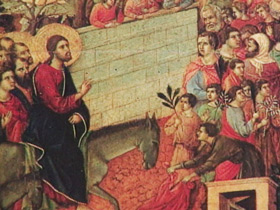
Msgr. MEIER: And so with that, he goes out to Gethsemane, where he prays, “Father, if this cup can pass, please let it pass by.” There’s this awful, human struggle over this real human suffering and death. And, having resolved himself that if it is God’s will that this happen, he will obey, he goes forth to meet the arresting company that arrest him. And of course, he is handed over to Pilate, the Roman governor. Therefore, Pilate condemns him on the political charge of claiming to be king of the Jews.
Rev. TAYLOR: I put myself in Jesus’s shoes and try to imagine what it is to understand that I have some extraordinary gift that I don’t understand. To have some understanding that I have been given power to heal, to feed, to do things, and at least twice in my life, I’ve heard a voice from heaven. And now I’m hanging on a cross. And if I ever needed to hear that voice, it’s now. If I ever needed an angel, if I ever needed my power, if I ever needed the gift, now is when I need it. And now is when it doesn’t come.
Rev. ADAMS: But he moved from that into this beautiful declaration of love from the cross. “Father, forgive them. They know not what they do.”
Rev. TAYLOR: The high point of Easter for me would be the Easter vigil, when we have spent one hour in a dark church, holding candles. And we are finally to the part in the service where the celebrant gets to go to the cross, with the candle, and yank off the black shroud and say, “Hallelujah, Christ is risen. The Lord is risen indeed.” And then the organ booms and the singing begins and the lights come up and the flowers are brought in. And you feel resurrected if you’ve been through Holy Week.
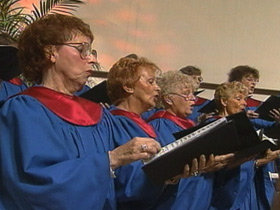
Msgr. MEIER: The resurrection itself is Jesus passing from death, the very real, human death he had undergone, into the fullness of eternal life in God’s presence.
Rev. ADAMS: The people heard this story and they match their lives against the story. They derive that same, continuing transformative power for their own lives. And they were transformed. Easter said that love prevailed, that love was right, not power, not hate, not guns, not gangs. Love. And that, to me, is the source of all the hope that is necessary for us to live meaningful, constructive, and delightful lives.


